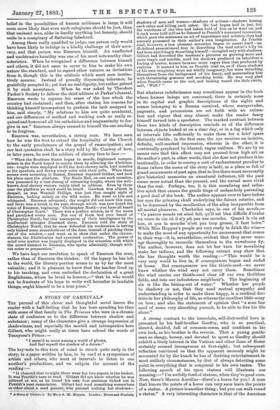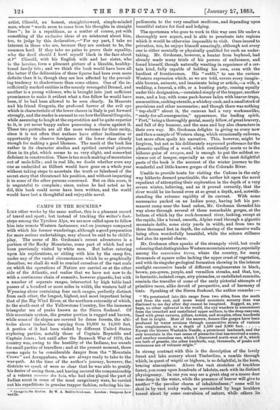A STORY OF CARNIVAL.*
THE perusal of this clever and thoughtful novel leaves the reader with a half-feeling that he has been spending his time with some of that family in The Princess who were in a chronic state of confusion as to the differenee between shadow and substance ; many of the characters give a strange impression of shadowiness, and especially the morbid and introspective hero
Gilbert, who might really at times have echoed the words of Tennyson's Prince :—
"I seem'd to move among a world of ghosts, And feel myself the shadow of a dream."
The key-note to this turn of mind is struck quite early in the story, in a paper written by him, to be read at a symposium of artists and others, who meet at intervals to listen to one
another's productions, and we subjoin the account of the' reading :—
"It chanced that to-night there were but two papers in the basket. It was Penrith's turn to read. Gilbert did not know whether he was relieved or not, as be heard his own first sentence ticked out in Penrith's neat enunciation. Gilbert had read something somewhere or other about a mad painter, who painted nothing but shadows- • A Story of Carnitol. By Mary A. M. Bursts. London : Hurst and Blaeiett• shadows of men and women—shadows of actions— shadows kissing each other and killing each other. He had begun half in jest, but the weirdness of the idea had taken hold of him as he went on, and it took more hold still as he listened to Penrith's measured intonation, which gave the sentences an air of importance and sobriety they had scarcely possessed in their author's own imagination. As Penrith read, however, a less pleasant sensation began to assert itself—an ill-defined presentiment that in describing the mad artist's folly he had been unwittingly describing himself—occupied only with shadows. Gilbert had described the madman's pictures as growing more and more tragic and terrible, until his shadows produced on beholders a feeling of horror, keener because more vague than that produced by realities. It seemed to him, as Penrith read on, as if .these shadows of his own imagining were not wholly imaginary, but were detaching themselves from the background of his fancy, and surrounding him, with threatening gestures and mocking looks. He was very glad when Penrith came to the end, and looking round the little circle, said, 'Well 2'"
But whatever indefiniteness may sometimes appear in the book where human beings are concerned, there is certainly none in its capital and graphic descriptions of the sights and scenes belonging to a Roman carnival, whose masquerades, pageants, and processions are set forth with an anima- tion and vigour that may almost make the reader fancy himself turned into a spectator. The marked contrast between
these two kinds of description reminds us of the difference. between objects looked at on a clear day, or in a fog which only at intervals lifts sufficiently to make them for a brief space distinctly visible ; in the first case, the eye receives an incisive, definite, well-marked impression, whereas in the other, it is
continually perplexed by blurred, vague outlines. We are by no- means sure that this effect may not proceed from high art on the author's part, in other words, that she does not produce it in- tentionally, in order to convey a sort of enchantment peculiar to Rome (where the scene of the story is laid), as a place so full of grand monuments of past ages, that to live there must necessarily give historical memories an unnatural influence, till the past seems more actual than the present, and the unreal more vivid than the real. Perhaps, too, it is this moralising and reflec- tive spirit that causes the gentle tinge of melancholy pervading a good deal of the book. The author appears ever to have before her eyes the grinning skull underlying the fairest exterior, and to be depressed by the recollection of the alloy inseparable from all mortal pleasures. Cherbuliez says, in one of his novels,— " Ce panvre monde est aiusi fait, pill eat hien difficlle d'avaler un verre de vin oil il n'y ait pas nue monche. Quand le vin eat Lou, et que la monche'n'est pas trop grosse, il fent boire." While Miss Hoppus's people are very ready to drink the wine— to make the most of any opportunity for amusement that comes
in their way—it is, nevertheless, evident that they never man- age thoroughly to reconcile themselves to the unwelcome fly. The author, however, does not let her turn for moralising-
make her tedious, and the following extract may show that she has thoughts worth the reading :—" This would be a very easy world to live in, if consequences began and ended at home. But consequences are like thistle-seed—we never know whither the wind may not carry them. Sometimes the wind carries our thistle-seed clear off our own thriftless
fields, and into our industrious neighbour's. The beginning a sin is like the letting-out of water." Whether her people
be shadowy or not, that they need mutual sympathy and understanding in order to make them happy, is a cardinal doc- trine in her philosophy of life, as witness the excellent little essay on love ; and also the statement of opinion that "a man has need of some very absorbing pursuit, to be able to live his life alone."
A strong contrast to the irresolute, self-distrustful hero is presented by his half-brother Geoffry, who is as practical, shrewd, decided, full of common-sense, and confident in his own luck, as his brother is the reverse. That a young gentle-
man so slangy, horsey, and devoted to sport as Geoffry should exhibit a lively interest in the Vatican and other lions of Rome certainly seemed incongruous at first-sight ; but subsequent reflection convinced us that the apparent anomaly might be accounted for by the knack he has of deriving entertainment in most unlikely circumstances, by dint of always detecting some point in everything that is congenial to his own tastes. The following speech of his upon statues will illustrate our meaning :—" l'm awfully fond of statues, when they're good ones. Now, there's Marcus Aurelius—there's a horse for you! A man that knows the points of a horse can very soon learn the points of a statue. A picture is another thing ; but you can walk round a statue." A very interesting character is.that of the American artist, Clissold, an honest, straightforward, simple-minded man, whose "words seem to come from his thoughts in straight lines " ; he is a republican, as a matter of course, yet with something of the exclusive ideas of an aristocrat about him, too, to judge by this declaration,—" For my part, I take no interest in those who are, because they are content to be, the common herd. If they take no pains to prove their equality, why the devil should I howl myself black in the face about it 14" Clissold, with his English wife and her sister, who is the heroine, form a pleasant picture of a likeable, healthy- toned family-trio ; and we think the book would have been all
• the better if the delineation of these figures had been even more definite than it is, though they are less affected by the prevail- ing tendency to shadowiness than some others. One of the in- sufficiently marked entities is the meanly revengeful Dremel, and another is a young widower, who is brought into just sufficient prominence to make it evident what a fine fellow he would have been, if he had been allowed to be seen clearly. In Memento and his friend Gregorio, the profound horror of the evil eye which is characteristic of the lower classes in Italy is put forward strongly, and the reader is amused to see how theliberal Gregorio, while assuming to laugh at the superstition and be quite superior to it, is yet never happy unless possessing a charm against it These two portraits are all the more welcome for their rarity, since it is not often that authors have either inclination or opportunity to observe foreigners of the lower class closely enough for making a good likeness. The merit of the book lies rather in its character studies and spirited carnival pictures than in its plot, which seems to us very slight, and somewhat deficient in construction. There is too much making of mountains out of mole-hills ; and in real life, we doubt whether even any 'one as undecided as Gilbert would have gone on a whole year without taking steps to ascertain the truth or falsehood of the secret story that threatened his position, and without imparting it to some of the other persons concerned. But on this score, it is ungrateful to complain ; since, unless he had acted as he did, this book could never have_ been written, and the world would have lost a thoughtful and enjoyable novel.







































 Previous page
Previous page